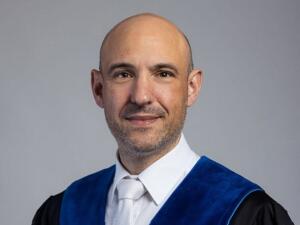Sanofi and Amgen still fighting for upper hand following Düsseldorf judgment
Düsseldorf local division has dismissed Sanofi and Regeneron's infringement claim against Amgen's cholesterol-lowering drug Repatha and Amgen's counterclaim for revocation. Neither side is likely to benefit significantly from the ruling. The battle, which began in 2014, shows no sign of ending.
13 May 2025 by Mathieu Klos
Amgen may continue selling its PCSK9 inhibitor Repatha with the active ingredient evolocumab in Belgium, France, Germany, Italy, and the Netherlands. This is the result of a decision today by the local division under presiding judge Ronny Thomas. The panel dismissed an infringement suit brought by Sanofi and Regeneron against Amgen (case ID: UPC_CFI_505/2024).
Amgen markets its drug in these countries as pre-filled pens and mini-dosers. Sanofi and Regeneron, which sells the competing product Praluent, had sought an injunction against Repatha sales, claiming the Amgen drug infringes EP 3 536 712 B1. The patent protects methods for reducing lipoprotein(a) levels by administering a PCSK9 inhibitor. Much of the hearing focused on how standard it was to measure LP(a) levels in clinical research and patient treatment.
Regeneron’s second medical use patent seeks to claim the effects of PCSK9 inhibitors on a specific lipoprotein, Lp(a).
- Ronny Thomas
- Bérénice Thom
- András Kupecz
- Xavier Dorland-Gallio
EP 712 is in force in Belgium, France, Germany, Italy, and the Netherlands and derives from a divisional application branched off from EP 2 756 004. This patent is subject to parallel national proceedings before the Regional Court Düsseldorf and a national validity attack.
Amgen had challenged the patent grant of EP 712 at the EPO. In late April, the EPO Opposition Division found it to be valid.
While Amgen directly appealed the EPO decision, the Düsseldorf local division has now also found EP 712 to be valid and rejected Amgen’s counterclaim for revocation. In addition to Thomas, the panel included Bérénice Thom as judge-rapporteur, András Kupecz as third legally qualified judge and Xavier Dorland-Galliot as technically qualified judge.
Both parties can now appeal today’s judgement, which is highly likely.
First ruling on second medical use patent
The Düsseldorf judgment is the first concerning a second medical use patent. The judges therefore state in their detailed headnotes that “in the case of a second medical use claim, a substance or composition within the meaning of Art. 54(4) EPC is used for any specific use which is not comprised in the state of the art. Such a therapeutic use can be a new indication, e.g. a disease not yet treated by the claimed substance, or an indication for a new group of patients”.
The judgment further states that “for a finding of infringement of a second medical use claim, the alleged infringer must offer or place the medical product on the market in such a way that it leads or may lead to the claimed therapeutic use of which the alleged infringer knows or reasonably should have known that it does. The requirements of such behaviour cannot be defined in an abstract manner but require an analysis of all relevant facts and circumstances of the patent claim in question”.
Regarding the patentability of second medical uses, the UPC judges write that “in order to benefit from the notional novelty afforded by Art. 54(5) EPC, second medical use claims must relate to a specific use in a method according to Art. 53(c) EPC. The sole reason why such claims can still be patented is the novelty (and inventiveness) of the new use”.
Sanofi and Amgen battling since 2014
Amgen and Sanofi, along with the latter’s partner company Regeneron, have battled over Praluent and Repatha since 2014. Initially, they fought in national patent courts. Both companies then escalated their dispute to the UPC.
In the court’s early days, Sanofi and Regeneron filed for revocation of Amgen’s EP 3 666 797. Only weeks later, Amgen sued Sanofi at the Munich local division for infringement of EP 767 (case ID: ACT_459916/2023).
In July 2024, the Munich central division declared EP 797 invalid for the entire UPC area. An appeal is pending. The Court of Appeal originally scheduled the hearing for next week but then decided to give both parties more time to argue their cases. It will now hear the case on 12 August 2025.
In early 2024, Sanofi and Regeneron went on the offensive and sued Amgen at the UPC for infringement of EP 712. In February, they filed another infringement suit against Amgen over EP 4 252 857 (case ID: ACT_10334/2025). Sanofi and Regeneron thus have two infringement suits pending before the UPC and the revocation case against Amgen’s EP 797. Amgen has one infringement case and two counterclaims for revocation.
Bardehle and Brinkhof for Amgen
As in other proceedings, Amgen mainly relies on teams from Bardehle Pagenberg and Brinkhof. Bardehle partner Johannes Heselberger led the oral hearing on 25 February 2025. Brinkhof partner Koen Bijvan was also present, as were patent attorney Axel Berger and lawyers Nadine Westermeyer and Dominik Woll from Bardehle.
- Johannes Heselberger
- Koen Bijvank
- Axel Berger
In other proceedings, Amgen also relies on Osborne Clarke, Quinn Emanuel and df-mp. Partner Hans Ulrich Dörries is responsible for Amgen’s opposition against EP 712.
German British team for Sanofi
Sanofi and Regeneron relied on its usual advisors Hoffmann Eitle and Carpmaels & Ransford in their first active case against Amgen. Both law firms were already involved in the previous disputes with Amgen.
Hoffmann Eitle lawyer and partner Niels Hölder led the oral hearing. Mike Gruber, Michael Pfeifer, and Melanie Schain completed the Hoffmann Eitle team.
- Niels Hölder
- Mike Gruber
- Agathe Michel-de-Cazotte
- Daniel Wise
The Carpmaels team was led by Daniel Wise. Agathe Michel-de Cazotte, Emily Nikolic, Kat Langford, Elizabeth Taylor, Hiske Roos, and Hadi Godazgar completed the team. The UK law firm also represents patent holder Regeneron in the EPO proceedings.
Jörk Zwicker led the patent attorney team from ZSP. Düsseldorf patent firm König Szynka Tilmann von Renesse was also involved in parallel proceedings but merged in early 2025 with Hoffmann Eitle.











